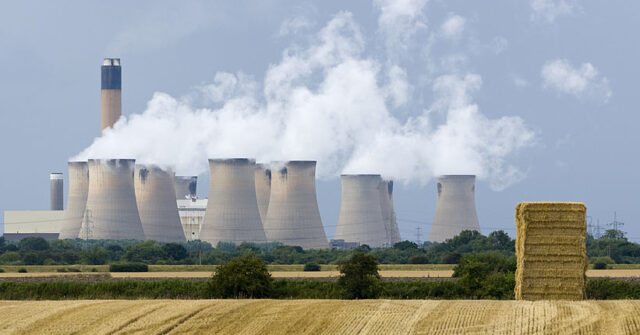Although called on several times to reconnect to the National Grid to provide backup power recently, and despite the real prospect of another winter energy crisis, the UK’s final reserve coal-fired power plants are to shortly go dark forever.
Drax and West Burton A coal-fired power plants are to be closed this year, despite the pair having been brought back online several times over the past year to meet potential shortfalls in supply as the country struggles with a government-pushed move to new energy sources at the time of a global natural gas-supply crisis.
There are presently four coal-fired power stations in the United Kingdom. Kilroot in Northern Ireland and Ratcliffe-on-Soar in Nottinghamshire both regularly work to provide power to the grid, contributing up to four per cent of the national power supply between them. Drax and West Burton are now backup stations generally kept cold and are only fired up in response to anticipated shortages where the Grid could potentially be overwhelmed by demand.
Green Agenda Setback! Cold Weather, Wind Not Blowing Sees UK Bring Coal Power Plants Back Online https://t.co/8r0ozGT6hX
— Breitbart London (@BreitbartLondon) January 22, 2023
All coal power stations, whether frontline or reserve, are due to close in the next year under new government rules on emissions making them uneconomical. In some cases, the plants have already been kept open years longer than originally planned in that government green strategy to meet demand.
Hypocritically, despite attacking coal generation through law, the government has still asked the Grid to examine whether some plants could still be kept in reserve to keep the lights on.
According to the Daily Telegraph, the answer has now come back as no, with the owners of Drax and West Burton A saying they will be shutting their plants down permanently. Per the report, the Grid said of the failed negotiations: “These discussions have now concluded. Both operators have confirmed that they will not be able to make their coal units available for a further winter and have begun the decommissioning process.”
Drax’s owners cited “technical, maintenance and staffing reasons” for their refusals. Not mentioned is the massive impact of government policy on the ability of the private companies which own and operate power stations in the UK to actually do their jobs: as one report in 2020 found, UK carbon taxes killed 93 per cent of coal-fired energy generation. University College London said:
British electricity generated from coal fell from 13.1 TWh (terawatt hours) in 2013 to 0.97 TWh in September 2019, and was replaced by other less emission-heavy forms of generation such as gas… Increased electricity imports from the continent reduced the price impact in the UK.
‘We’re Led by Idiots’ – Farage Slams Green Agenda as Reserve Coal Power Stations Fired Up https://t.co/oB5L0ClPi3
— Breitbart London (@BreitbartLondon) December 12, 2022
This system appeared to work well until Russia invaded Ukraine, considerably increasing the price of natural gas imported by the United Kingdom to provide the now majority of its power, and the spare capacity of electricity in Europe that the United Kingdom could import to cushion the blow.
As previously reported, the coal plants at Drax and West Burton A were called upon several times to prepare to provide backup power to the Grid last winter during this war-caused energy crisis, although they only actually contributed on one occasion, in March. A further instance of providing power occurred this summer, when national demand — it was said — for air conditioning was so great it exceeded the capacity of the Grid to generate, and coal was once again called in for support.
Breitbart London previously reported:
The United Kingdom government has been pursuing an aggressive policy of removing coal from its national coal generation mix, and all three plants activated today were meant to be shut downforever by September last year.
Yet the invasion of Ukraine by Russia a year ago appears to have reminded some in Whitehall that having a blend of different power sources to fall back on can be a blessing when the main heavy-lifters — in the UK’s case, gas and wind — both fail to deliver at the same time. The government put out a call for coal plants heading for the planned end of their lives to extend their service to March 2023 during the Summer.
Among them were Drax and West Burton. As the operators of Drax said of the agreement to keep the power station maintained but not generating just in case through this winter in at the time: “At the request of the UK Government, Drax has agreed to delay the planned closure of its two coal-fired units and help bolster the UK’s energy security this winter”. The group said they would source 400,000 tonnes of additional coal to hold one terawatt of electricity generation in reserve at their plant for this winter, underlining a key strategic benefit of coal, the ease of energy storage.
Despite the experience of this winter that unexpected energy shortages can happen and having a handful of coal plants on long-term standby can be a valuable fallback, the plants being started up again today to possibly keep the lights on tomorrow are all still due to be decommissioned in March 2023. Whether energy generators themselves believe this is a good idea or not is unclear, especially given how just today the National Grid called having coal as a contingency backup “prudent”. Breitbart London has contacted the National Grid for comment.
Moderns continue to discover so many self-created problems actually have simple, elegant solutions baked into tradition. Next time a paper tells you an electric bus is a revolutionary idea, or there’s chemicals in your plastic water bottle, remember where we were a century ago pic.twitter.com/D5XgptBWEG
— Oliver JJ Lane (@oliver_lane) June 14, 2023


